How to Document Commercial Kitchen Equipment Issues for Quick Solutions

Unexpected equipment malfunctions can bring your commercial kitchen to a standstill, causing delays, safety concerns, and unnecessary costs. Properly documenting equipment issues is one of the most effective ways to streamline repairs and minimize downtime. In preparation for a technician’s visit, having clear records of equipment problems can help ensure a faster, more efficient repair process. In this guide, we’ll explore the importance of structured documentation, offering best practices for reporting problems and logging repairs to keep your kitchen running smoothly.
Ready to minimize equipment downtime and ensure fast repairs? Explore Smart Care’s expert commercial kitchen maintenance and repair services today.
Table of Contents
- Summary
- Key Takeaways from this Blog
- Why Clear Documentation is Essential for Commercial Kitchen Equipment
- How to Report Equipment Issues Effectively
- Keep Your Kitchen Running Smoothly with Smart Care
Summary
Unexpected equipment malfunctions can bring your commercial kitchen to a halt, leading to costly downtime and safety concerns. Properly documenting equipment issues ensures faster diagnostics, minimizes disruptions and helps prevent recurring problems. This guide covers best practices for logging equipment problems, utilizing checklists, and training staff to improve efficiency. Implementing a structured documentation system supports compliance, enhances preventative maintenance, and extends the lifespan of your kitchen equipment. Smart Care provides expert repair and maintenance services to keep your commercial kitchen running smoothly.
Key Takeaways from This Blog
- Properly documenting commercial kitchen equipment issues helps technicians diagnose and resolve problems quickly, reducing costly downtime.
- Keeping detailed commercial kitchen repair records ensures compliance with industry regulations and enhances preventative maintenance efforts.
- Using checklists and digital maintenance logs streamlines issue reporting, making tracking recurring problems easier and improving efficiency.
- Training staff on proper documentation ensures consistent reporting and faster repairs for food service equipment.
- Partnering with Smart Care’s expert repair and maintenance services helps keep your commercial kitchen running smoothly and minimizes unexpected breakdowns.
Importance of Detailed Documentation for Commercial Kitchen Equipment
Thorough documentation of commercial kitchen equipment issues benefits your business in several ways:
- Speeds Up Repairs: Providing detailed information allows technicians to diagnose and resolve issues quickly.
- Minimizes Equipment Downtime: A structured reporting system helps address problems promptly, reducing disruptions in kitchen operations.
- Enhances Preventative Maintenance: Tracking recurring issues can help identify underlying problems before they lead to significant breakdowns.
- Ensures Compliance and Safety: Keeping commercial kitchen repair records supports compliance with industry regulations and health codes.
- Reduces Repair Costs: Accurate documentation helps prevent unnecessary service calls and allows for more efficient troubleshooting.
How to Report on Kitchen Equipment Issues
A well-organized reporting system ensures that commercial kitchen equipment issues are properly documented and addressed. Follow these steps to improve efficiency:
1. Record Essential Information
When logging equipment issues, ensure that the following details are captured:
- Equipment Details: Include the make, model, serial number, and specific location in the kitchen.
- Issue Description: Provide a clear and concise explanation of the problem, including when it was first noticed and any unusual symptoms (e.g., strange noises, error codes, performance issues).
- Operational Context: Describe when the issue occurs: during peak hours, after cleaning, or during specific tasks.
- Previous Maintenance History: For reference, log past repairs, service visits, and preventative maintenance efforts.
- Temperature and Performance Logs: For refrigeration units and ovens, document any inconsistencies in temperature readings to help identify potential issues.
- Photographic or Video Evidence: Attach photos or videos of the issue to aid technicians in diagnosing the problem remotely.
2. Utilize Checklists for Consistency
Standardized maintenance and inspection checklists help ensure no critical details are missed when reporting issues. Consider creating equipment-specific checklists for:
- Refrigeration units: Temperature logs, compressor performance, and recent cleanings.
- Cooking equipment (ovens, fryers, grills): Burner/element function, calibration checks, and ventilation conditions.
- Dishwashers and sinks: Water pressure, drainage issues, and filter maintenance.
- HVAC and ventilation systems: Airflow consistency and filter cleanliness.
Using digital maintenance logs or mobile apps can further streamline reporting and improve accessibility, ensuring that technicians have all necessary information before arriving on-site.
3. Train Staff on Proper Documentation
Ensuring kitchen staff understands how to report equipment issues properly is vital for maintaining a smooth workflow. Consider implementing:
- Routine Training Sessions: Educate employees on the importance of documenting equipment issues and how to use reporting tools effectively.
- Designated Maintenance Leads: Assign specific team members to oversee documentation, ensuring accuracy and consistency.
- Encouragement of Immediate Reporting: Promote a culture where staff members feel responsible for reporting problems as soon as they arise rather than waiting until equipment fully malfunctions.
4. Schedule Regular Equipment Audits
- Preventative Maintenance Checks: Conduct routine inspections to identify potential problems before they lead to breakdowns.
- Documenting Performance Trends: Record recurring minor issues to predict when major repairs or replacements may be needed.
- Service Provider Coordination: Partner with a trusted repair and maintenance provider, such as Smart Care, to ensure fast and effective service when needed.
Partner with Smart Care for Reliable Kitchen Equipment Maintenance
Clear documentation of commercial kitchen equipment issues is key to preventing costly downtime and ensuring smooth operations. You can streamline repairs and enhance preventative maintenance by implementing structured reporting, utilizing checklists, and training staff on proper documentation. For expert repair and maintenance services tailored to commercial kitchens, trust Smart Care. Contact us today at (888)-887-1675 or fill out our contact form to schedule a service. We provide nationwide coverage. Visit our Find a Service Page to locate a technician near you. Keep your kitchen operating efficiently with Smart Care’s trusted maintenance solutions.
